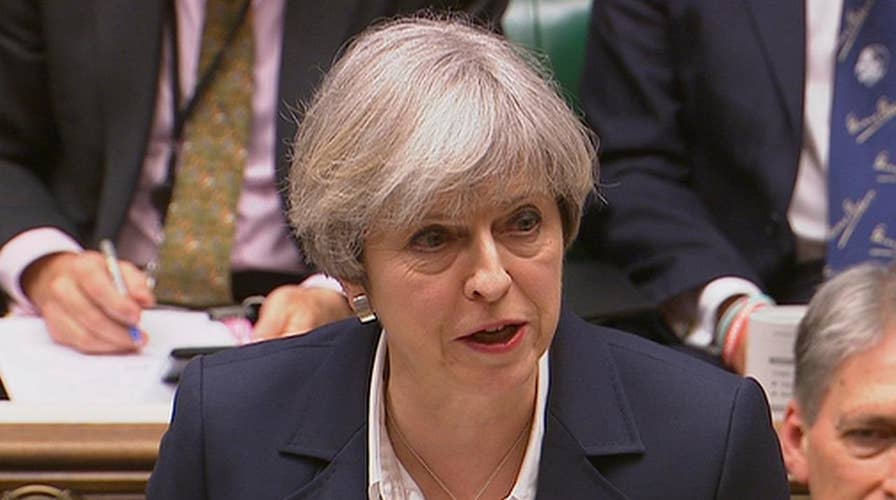Theresa May officially triggers Brexit process
British prime minister sends letter to European Council President Donald Tusk formally triggering Article 50, the start of negotiations for the United Kingdom's divorce proceedings from the European Union
ROME – A day after officials triggered the Brexit divorce proceedings European security experts said they worried about the prospect of protecting the continent without the UK's policing expertise.
EU member states have immediate access to a large Europol database. Non-member states don't. The United Kingdom has yet to work out the details of its future relationship with European bodies, including police.
At a conference on radicalization, organized by the Euro-Gulf Information Centre in Rome, Dietrich Neumann of Europol said UK’s law enforcement officials have been an integral part of Europe’s efforts to combat terrorism.
BREXIT FALLOUT: EU DRAFT GUIDELINES SOFTEN PUBLIC STANCE ON FUTURE UK RELATIONSHIP
"I would call the UK the birthplace of the technique we call intelligence-led policing,” Neumann said. “Which essentially means you connect information you have at police level, you connect it very widely, to try to figure out the motives of the perpetrator – where are the hidden kingpins that drive this illegal network?"
Neumann added that having the UK out of the tight European intelligence loop, if that is what happens after Brexit is said and done, would very likely be a loss for all.
Neumann also said Europol is making great strides in gathering intelligence on terror suspects. In 2015, the agency had information on 18 Europeans who went to join ISIS in the key conflict zones. Now, they have information on 9,000.
He added that Europol has managed to get 20,000 websites or posts deemed poisonous taken off social media sites. Now, as the debate over privacy vs. security rages, they say they need access to encrypted messages to better track terrorists.
Julia Dockerill, who works with a British member of Parliament but who is also a lawmaker in the Tower Hamlets borough of London, a neighborhood that has been caught in the crosshairs of radicalization, has been in the thick of Britain's struggle with terrorism. She was in Parliament last Wednesday when it was attacked by a crazed man who ran over pedestrians before murdering a Westminster police officer with a knife. She describes the fear of hunkering down inside Parliament, not knowing whether or not terrorists had gotten inside the building.
EU LEADER WARNS TRUMP ON BREXIT: I'LL SUPPORT BREAKING UP THE US
She spoke about how London has a long history of fighting terror, and how the city's landscape has changed over the decades to make it safer, from narrowing certain roads so that number plates can be more easily read, to the placing of heavy posts or pillars placed strategically to block certain streets or buildings from vehicular traffic.
But she acknowledged there are limits to keeping London safe.
"That's not to be complacent, but when somebody is willing to drive at people in a car, you have to accept that there is only so much the authorities can really do to prepare us for that kind of attack,” she said. “So I think the population is going to be level-headed about that now."
At the same time, Dockerill has been with her constituents, in the trenches, trying to find the right formula for keeping vulnerable young people from radicalizing. Tower Hamlets, with a large Muslim population, the majority Bengali, has been struggling with the presence of Islamic extremism since before 9/11.
But it took three school girls running off to join the Islamic State in February 2015 to deliver a real wake-up call to the Muslim community of the borough. Before that, Dockerill said, she felt there was an "us vs. them," attitude on the part of the Bengali community.
POLES FACES POST-BREXIT EUROPE WITH CONFUSION AND FEAR
Parents realized they had a problem. People started coming forward with names dozens of young people they feared were at risk of radicalization.
A more sensitive approach on the part of police and authorities also changed the dynamic, Dockerill said.
"We ceased to view radicalization as a crime or criminal problem, but started viewing it as a safe-guarding issue, like sexual exploitation or violence against women,” she said. “We took a much more social work approach, rather than a police approach, toward people we thought were vulnerable to extremism."
Germany's hands are full with a new wave of residents, many of whom come from countries where, in some cases, decades of fighting and instability have radicalized the population. Kristina Eichhorst, director of terrorism studies at the Konrad Adenauer Foundation in Germany said that while online recruiting has netted significant numbers of terrorists or wannabe terrorists, peer-to-peer contact can be equally seductive to lost, violence-prone people.
"It can be much more efficient and dangerous, convincing people to really join the cause of Daesh (the Arabic acronym for ISIS),” Eichhorst said. “These radical Islamists were in a sense the best social workers because they were there to offer a space, to offer friendship, to offer a sense of belonging and so an approach to counter that needs to be on the ground, be local and offer an alternative space in the real world."
The experts gathered in Rome agreed largely that there is no one classic profile of a potential terrorist and therefore no one-size-fits all strategy to counter radicalization. With Mosul – one of ISIS' two strongholds – falling, there is also the puzzle of what this might mean for Europe.
But when it comes to ISIS terrorism, Benedetto Della Vedova, Italian undersecretary of State For Foreign Affairs and International Cooperation, said any attack, in any city, is an attack on the way of life we all share.
“The response always,” he said, “has to be on a European level.”





















